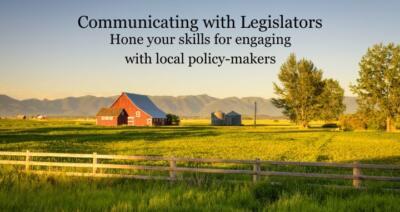Gordon’s Policy Corner, October 2023
Our political and civic institutions are similar to agricultural operations. Both require a degree of predictability and adherence to deadlines to function effectively. In the same way that farmers depend on predictable climate patterns for successful cultivation, our governments rely on stability to meet the deadlines that shape policies and funding critical to our society.
Aerial view of storm water on cotton fields that are already saturated with days of heavy rain. USDA Photo by Lance Cheung.
However, both realms face growing unpredictability. Climate change has disrupted farming with unpredictable weather patterns, altering frost dates, precipitation, and pest cycles, making it challenging to maintain smooth agricultural operations. Similarly, the political landscape in Washington, D.C., has become increasingly erratic, impacting our ability to foresee legislative actions and their potential effects.
This past month, Congress narrowly averted a government shutdown and allowed the 2018 Farm Bill to expire. Now, they have until November 15th to pass crucial Appropriations bills or another Continuing Resolution to keep the government funded. Additionally, there’s a tight deadline until late December to pass a new Farm Bill or extend the current one. However, the latter seems less likely due to persistent political disagreement.
The dynamics of climate instability and political gridlock are deeply interconnected. Yet, amidst this uncertainty, there is a powerful action we can all take to influence change: effectively communicating to legislators and policymakers how these issues impact our lives. Organic Farming Research Foundation (OFRF) is offering another round of our ‘Communicating with Legislators Workshop’ to support this work.
Here’s a snapshot of what you should know and what the workshop will cover in more detail:
- Legislatures are Reactive: Legislative processes respond to public concerns and emerging issues. If they don’t know about a problem or issue, they can’t act on it; conversely, if they don’t know something significant is happening, they can’t defend or support it.
- Legislatures are Slow-Working: The pace of legislative work is deliberate to ensure thorough consideration of implications. Continuous engagement ensures our perspectives remain in their purview as they deliberate policies.
- Consistent Input is Crucial: Legislatures need regular, diverse, and informed input from citizens to make effective and well-informed decisions.
Our ‘Communicating with Legislators Workshop’ is tailored for farmers and researchers in the organic farming sector. We equip you with insights into how legislatures operate, emphasizing your vital role in communicating about the issues you care about.
 One critical area where consistent input is necessary is in the realm of organic agricultural research. Organic farming isn’t just a buzzword; it’s a key player in our fight against climate change. The unpredictability climate change introduces is a significant challenge for farmers. Organic agricultural practices can mitigate climate change by reducing greenhouse gas emissions, promoting soil health, and enhancing resilience to extreme weather events. Research in this field is essential for mitigating and adapting to climate change, and we need policymakers to understand the importance of continuing to invest in it. However, this research is primarily funded through public appropriations, which have been decreasing since 2000.
One critical area where consistent input is necessary is in the realm of organic agricultural research. Organic farming isn’t just a buzzword; it’s a key player in our fight against climate change. The unpredictability climate change introduces is a significant challenge for farmers. Organic agricultural practices can mitigate climate change by reducing greenhouse gas emissions, promoting soil health, and enhancing resilience to extreme weather events. Research in this field is essential for mitigating and adapting to climate change, and we need policymakers to understand the importance of continuing to invest in it. However, this research is primarily funded through public appropriations, which have been decreasing since 2000.
Join us in this workshop to learn best practices and how you can advocate for increased investments in organic agriculture and research. Your voice matters, and it’s a potent force in shaping the future of our agriculture sector. Together, we can navigate these unpredictable times and work towards a more stable and supportive environment for organic farming.
Workshop registration is free. More info on our events page.


